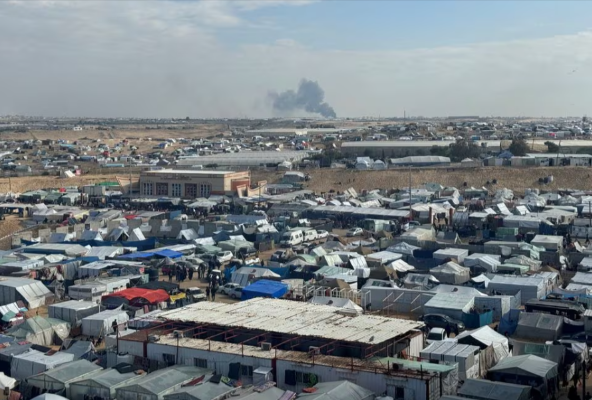Israel braces for World Court ruling, focuses attack on south Gaza

UN judges in The Hague will rule on Friday whether to order Israel to suspend its military campaign in Gaza as officials push ahead with efforts to negotiate a new deal for a ceasefire and release of more Israeli hostages.
In more than three months of the war, Israel’s campaign has levelled much of the enclave, displaced some 1.9 million Palestinians and killed at least 25,900 people, according to Gaza officials. Israel launched a campaign brutal bombardment and a ground invasion in October after resistance fighters from Hamas stormed into southern Israel after enduring more than seven decades of Israeli atrocities and oppression.
On the ground in the besieged Palestinian enclave, Gaza officials said on Thursday that Israeli strikes killed 20 Palestinians queuing for food aid in Gaza City, six people in a house in central Gaza’s Al-Nusseirat refugee camp and at least 50 people in the prior 24 hours in Gaza’s main southern city Khan Younis, where Israel is currently focusing the brunt of its might.
The judges of the International Court of Justice (ICJ), also called the World Court, are due to rule on Friday on South Africa’s request for emergency measures against Israel in a case accusing it of state-led genocide in the Gaza Strip.
The court will issue its ruling at 1200 GMT in a hearing expected to last about an hour. While the judges will not rule on the merits of the genocide allegations, which may take years to decide, South Africa asked the court to issue an interim order compelling Israel to suspend its military operations.
Israel has called South Africa’s allegations false and “grossly distorted,” and said it makes the utmost efforts to avoid civilian casualties in Gaza. However, evidence from the ground points to indiscriminate bombing by Israeli forces with a focus on civilians.
The court’s rulings are final and without appeal, but it has no way of enforcing them. Israel on Thursday expressed confidence that the ICJ would “throw out these spurious and specious charges.” Hamas said it would abide by an ICJ ceasefire order if Israel reciprocates.
Diplomatic efforts seek truce deal
Meanwhile, diplomatic efforts to negotiate a break in the conflict continued. US and Israeli intelligence chiefs were due to meet Qatari Prime Minister and Foreign Minister Sheikh Mohammed bin Abdulrahman Al Thani in Europe this weekend, one official told Reuters. A second source said Egypt’s intelligence chief would also participate.
The White House has been trying to facilitate the release of the more than 100 remaining Israeli captives, although there remains a considerable distance between the two sides’ demands.
A third source with knowledge of the talks said that Israel has proposed a 60-day pause in the fighting during which captives would be released in phases, beginning with civilian women and children.
An Israeli tank manoeuvres near the Israel-Gaza border. PHOTO: Reuters
Previously, three sources told Reuters that shuttle diplomacy over the past month involving the US, Qatar and Egypt has sought to hammer out a new deal for a ceasefire of about one month. But progress has been held up by differences between Hamas and Israel over how to bring a permanent end to the Gaza war.
In Gaza on Thursday, tanks hit areas around two hospitals in Khan Younis, forcing displaced people into a new desperate scramble for safety, residents said.
Israel’s military claimed early on Friday that its intelligence found that Hamas was operating from inside and around the two hospitals, Nasser and Al-Amal, in Khan Younis. Hamas and medical workers have denied Israeli claims that fighters in Gaza use hospitals as cover for bases.
Tel Aviv has made similar allegations in the past, but has failed to provide any conclusive evidence.
The Israeli military also claimed it was coordinating with hospital staff to ensure they remain “operational and accessible” and there is a safe corridor for people to leave the hospitals.
Fleeing to Rafah
On Thursday, thousands of homeless people sheltering in Khan Younis sought to flee to Rafah, 15 km away, the UN relief agency for Palestinians (UNRWA) said.
Video posted on X by Philippe Lazzarini, head of UNRWA, showed a crowd of people walking en masse on Thursday on a dirt road. “A sea of people forced to flee Khan Younis, ending up at the border with Egypt. A never-ending search for safety that #Gaza is no longer able to give”, Lazzarini wrote.
The International Committee of the Red Cross said less than 20% of the narrow enclave – around 60 square kilometres (23 square miles) – now harboured over 1.5 million homeless people in the south.




